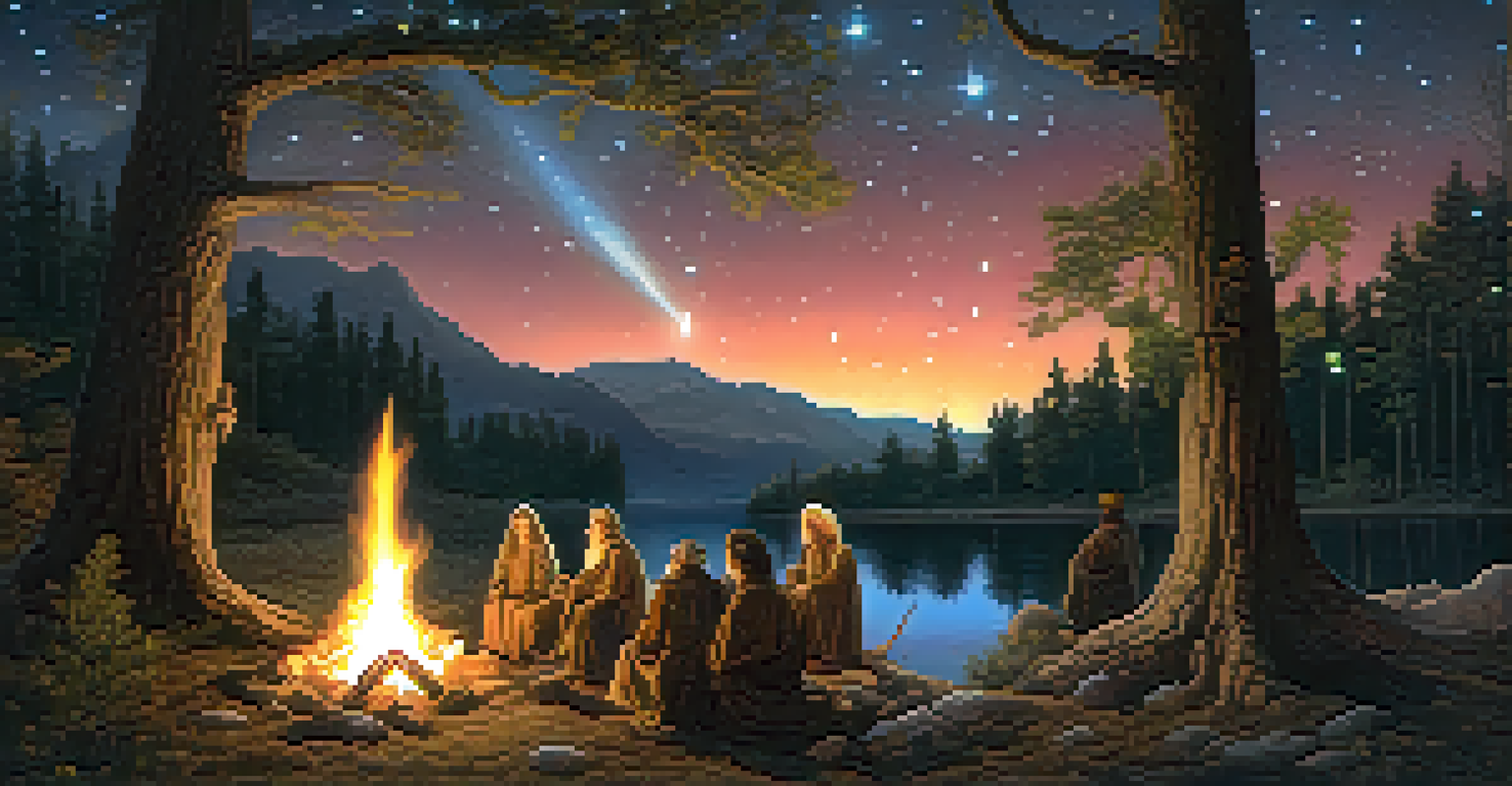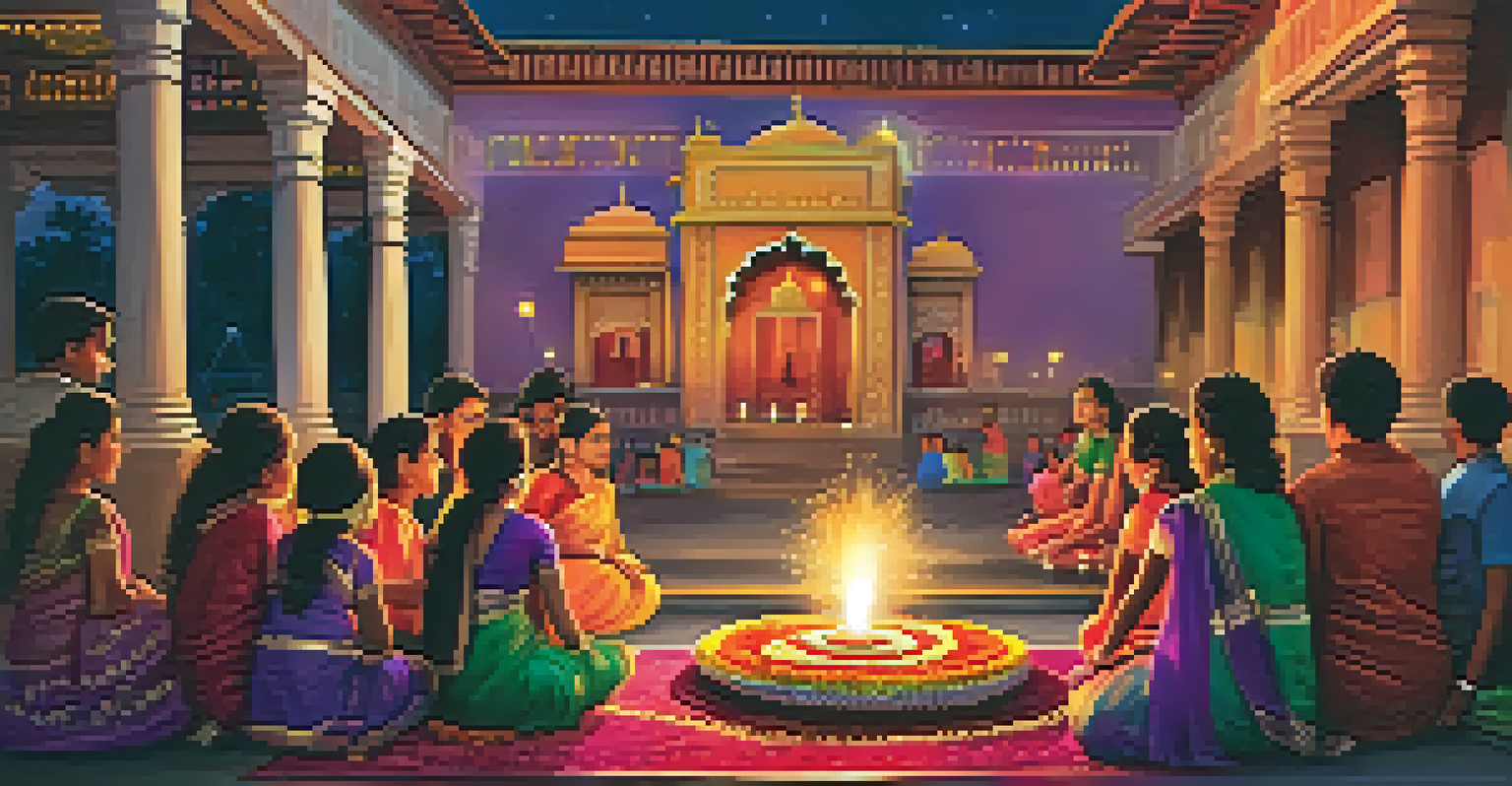The Role of Mythology in Shaping Spiritual Beliefs

Understanding Mythology and Its Significance
Mythology is a collection of stories that cultures tell to explain their world, often involving gods, heroes, and creation myths. These narratives not only entertain but also serve as a framework for understanding fundamental truths about existence. For example, the Greek myths explain natural phenomena while offering moral lessons. This dual purpose of mythology makes it a vital component of spiritual beliefs across different cultures.
Myth is not a lie; it is a story that reveals a deeper truth.
In many societies, mythology provides a shared language that helps individuals connect with their history and values. This connection can foster a sense of belonging and identity, allowing people to navigate the complexities of life. Just as a family story can bind relatives together, cultural myths can create a communal bond among a population. This shared understanding shapes how individuals perceive spiritual matters.
Ultimately, mythology acts as a bridge between the past and present, influencing contemporary spiritual practices. By weaving ancient stories into modern beliefs, people can find relevance and guidance in their spiritual journeys. Whether through rituals, ceremonies, or personal reflections, mythology remains a cornerstone of spiritual exploration.
The Connection Between Mythology and Spiritual Practices
Spiritual practices often draw directly from mythological narratives, providing a context for rituals and beliefs. For instance, many indigenous cultures incorporate mythological stories into their ceremonies, using them to invoke divine presence or wisdom. This practice emphasizes the importance of storytelling in creating a meaningful spiritual experience.

Consider how the Hindu festival of Diwali celebrates the return of Lord Rama, a mythological hero. This narrative not only marks a significant event in the myth but also shapes the spiritual rituals associated with the festival. Participants engage in prayers and lighting lamps, symbolizing the triumph of light over darkness, which reflects their spiritual beliefs and values.
Mythology Shapes Cultural Identity
Mythology serves as a crucial framework for cultural identity, reflecting shared beliefs and values that connect individuals to their heritage.
Such connections illustrate how mythology can imbue spiritual practices with depth and significance. By anchoring rituals in familiar stories, practitioners can feel a sense of continuity with their ancestors and cultures. This blend of narrative and practice enriches the spiritual experience, making it more impactful and relatable.
Mythology's Influence on Moral and Ethical Beliefs
Many mythological narratives contain moral lessons that shape the ethical frameworks of societies. These stories often highlight virtues such as courage, honesty, and compassion, guiding individuals in their spiritual and everyday lives. For example, the tale of Prometheus in Greek mythology emphasizes the value of self-sacrifice for the greater good.
Myths are public dreams, dreams are private myths.
Such narratives encourage individuals to reflect on their values and aspirations, aligning their actions with the moral lessons found in mythology. This alignment can lead to a more profound spiritual connection, as individuals seek to embody the virtues portrayed in these stories. In essence, mythology can serve as a moral compass, guiding believers in their spiritual journey.
Moreover, these ethical teachings often transcend cultural boundaries, resonating with universal human experiences. By engaging with these timeless narratives, individuals can cultivate a more profound understanding of their spirituality and how it relates to ethical living. This connection between mythology and morality reinforces the significance of spiritual beliefs in daily choices.
Mythological Archetypes and Their Spiritual Impact
Mythological archetypes, such as the hero, the trickster, or the wise old man, play a significant role in shaping spiritual beliefs. These recurring characters embody essential qualities that resonate with human experiences, enabling people to connect with these traits in their own lives. For instance, the hero's journey often represents personal growth and transformation, reflecting the spiritual journey many undertake.
When individuals identify with these archetypes, they can gain insights into their spiritual path and challenges. This identification can empower them to embrace their struggles as part of a larger narrative, fostering resilience and hope. By viewing their experiences through the lens of mythology, they can find meaning and purpose in their spiritual pursuits.
Mythology Guides Spiritual Practices
Spiritual practices often draw on mythological narratives, enriching rituals with meaning and fostering a deeper connection to tradition.
Furthermore, archetypes can serve as guides in navigating life's complexities. By embodying the qualities of a mythological figure, individuals can cultivate a deeper understanding of themselves and their spirituality. This connection to archetypes enhances their personal growth, making mythology a valuable resource in spiritual development.
The Role of Mythology in Cultural Identity
Mythology plays a crucial role in shaping cultural identity, as it encapsulates the shared beliefs, values, and history of a community. These narratives often serve as touchstones for cultural pride and continuity, influencing how individuals perceive their place in the world. For example, Native American myths often reflect a deep connection to nature and the land, shaping both spiritual beliefs and cultural practices.
As cultural identity evolves, so too does the interpretation and relevance of mythological stories. Contemporary societies may reinterpret these narratives to align with modern values while preserving their core messages. This adaptation can foster a sense of belonging and connection to one's heritage, reinforcing spiritual beliefs rooted in cultural history.
Ultimately, mythology acts as a living tradition, continuously influencing cultural identity and spiritual beliefs. By engaging with these stories, individuals can explore their roots and discover how their spirituality is intertwined with their cultural heritage. This exploration can deepen their understanding of both themselves and the world around them.
The Intersection of Mythology and Religion
Mythology and religion are often intertwined, with many religions drawing upon mythological narratives to explain their beliefs. These stories can provide context for rituals, moral teachings, and the nature of the divine, creating a rich tapestry of spiritual understanding. For instance, the creation myths found in various religions often share common themes, reflecting humanity's quest for meaning.
Religious texts frequently incorporate mythological elements, allowing adherents to engage with these narratives on a spiritual level. This interaction can deepen one’s faith and understanding of the divine, as individuals find resonance in the stories that reflect their beliefs. The blending of mythology and religion creates a multifaceted spiritual landscape that encourages exploration and reflection.
Mythology Offers Moral Lessons
Many myths convey moral teachings that can guide individuals in aligning their actions with ethical values and spiritual aspirations.
Moreover, the shared themes found in different mythologies can highlight the universality of human experience in spirituality. By recognizing these connections, individuals can appreciate the diverse ways that cultures express their beliefs, fostering greater empathy and understanding. This intersection of mythology and religion enriches the spiritual journey, inviting exploration and dialogue.
The Modern Relevance of Mythology in Spirituality
In today’s fast-paced world, mythology remains relevant as individuals seek meaning and connection in their spiritual lives. Modern interpretations of ancient myths often resonate with contemporary struggles, offering insights into personal growth and resilience. For example, the myth of Persephone and her journey through the seasons reflects themes of transformation and renewal, which many people can relate to.
This relevance is evident in various spiritual practices that incorporate mythological elements, such as yoga, meditation, and storytelling. By engaging with these narratives, individuals can find solace, guidance, and inspiration in their spiritual exploration. The adaptability of mythology ensures that it continues to speak to the human experience, regardless of the era.

Furthermore, the resurgence of interest in mythology can be seen in literature, film, and art, where these timeless stories are reimagined for new audiences. This creative engagement invites individuals to reflect on their own beliefs and experiences, encouraging a deeper connection to spirituality. Ultimately, the ongoing relevance of mythology underscores its significance in shaping spiritual beliefs today.